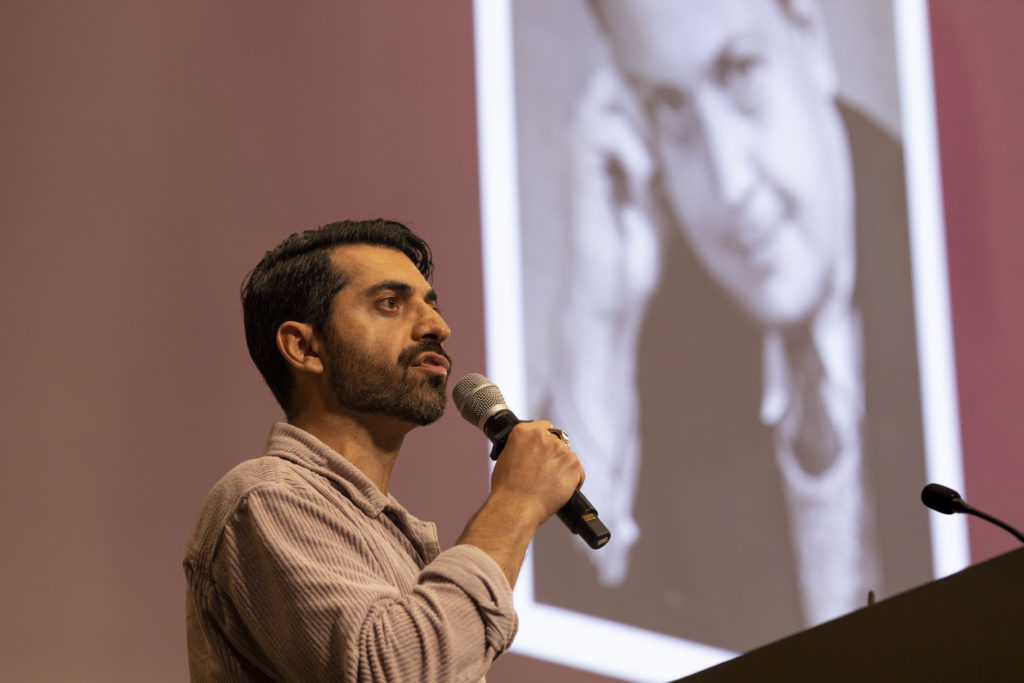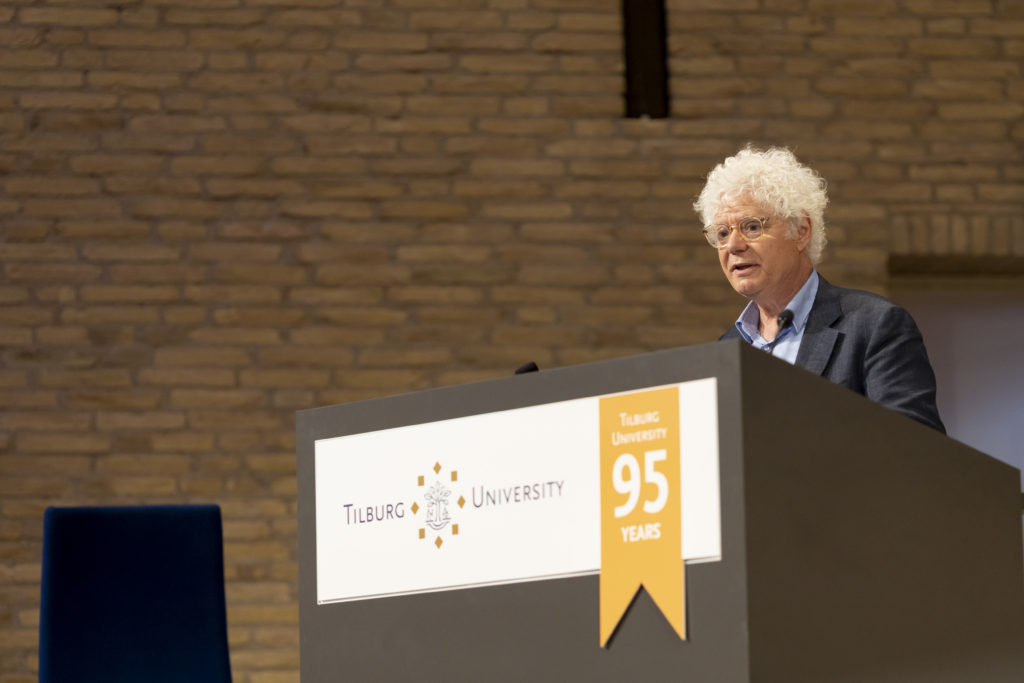Identity and borders: Sinan Çankaya and Paul Scheffer captivate audience at E. du Perron Prize-giving ceremony
During Night University, the Auditorium of Cobbenhagen Building was entirely dedicated to the E. du Perron Award ceremony and lecture. The search for identity, whether or not to impose borders, and the importance of a good story were the theme of the evening. Emeritus Professor of European Studies, Paul Scheffer, spoke about old and new wars and the values of Europe. The winner of the E. du Perron Prize is Sinan Çankaya. He was allowed to collect the prize money—10,000 euros—for his book My Countless Identities.

How can you really understand the values of Europe? Not if you lack the power of imagination, says Paul Scheffer in his E. du Perron Lecture. According to the Emeritus Professor, every European experiences the European continent differently. This is based on their own history and traumas, and these ensure a different understanding of European values.
Take, for example, World War II: one of the low points in European history. World War II left deep wounds throughout Europe (and beyond). But it is important to realize that not every country has the same wounds, Scheffer argues. For Poland, for example, it was not the Germans but the Russians who first invaded their country. The country was divided into two parts, with the Russians on the one hand and the Germans on the other. So, the way Poland relates to this particular point in history is vastly different from a country like the Netherlands.
This also applies to the meaning of a national border, Scheffer explains. The Dutch national borders have mostly been meaningful in the past century. For Poland this is less obvious since this country has often had to shift its borders. With this knowledge in mind, Scheffer says it is therefore wrong to say that Dutch manners are the standard for other European countries.
Scheffer emphasizes the importance of thinking beyond one’s own imagination and appeals for empathy: learn to put yourself in another time, place, and culture. This is necessary to hold on to the collective European attention for an event that has a huge impact on one European country: “It is logical that Zelensky is already desperately calling on Europe not to forget Ukraine. By continuing to tell Ukraine’s story, he is fighting against oblivion.”

E. du Perron Prize
Someone who also tells an important story is the winner of the E. du Perron Prize: Sinan Çankaya. The jury praised his debut novel My Countless Identities for its ability to invite the reader to engage in self-reflection. Çankaya tells the story of a migrant who never migrated. As the son of Turkish migrant workers, but born in Nijmegen, he has been addressed as ’the Turk’ all his life. Quoting from his own work, Çankaya sketches a painful but recognizable dialogue in his victory speech:
“‘Where are you from?’ ‘From Nijmegen.’ ‘No seriously!’ ‘From Nijmegen, seriously.’ ‘No, but you know what I mean, don’t you?’ ‘No.’ ‘You don’t look like you’ve been pulled out of the North-Holland clay, so to speak.’ I can’t disguise it, with my black hair, brown eyes, and slightly tinted skin, I am a deviation from the ordinary Dutch person. These kinds of countless confrontations punched many small and sometimes big cracks in my self-image.”
When you deviate from the “normal,” you are always defined by those around you. They stick their perception of an appropriate identity on your forehead. Something Çankaya—main character in his own book—struggles with immensely. In addition, he shares the pain of a “different kind of migration,” namely, the pain of social ascent. Unlike his parents, Çankaya completed a university education and later even managed to obtain a PhD: “There is an alienation and melancholy that you experience towards the people from your old neighborhood and family members, because you don’t really understand each other anymore,” he says.
The question of who he is, to which he belongs, and to which he is allowed to belong forms a minefield for himself and for the reader. Because, as Marcelle Hendrickx, alderman for education of Tilburg Municipality aptly put it: “The jury has read My Countless Identities with an aching stomach and enormous admiration. With shame and with happiness. The book will haunt you for a very long time.”
Appeal to empathy
The importance of putting oneself in the other’s shoes proved to be the fundamental theme of the evening. One cannot and should not determine the identity and values of the other. With the message to dare to think beyond your own imagination, the audience left the room. The tinted man is simply a Dutchman, but above all himself. And the strength of Europe does not lie in the values of the Netherlands alone. The words of spoken word artist Danielle Zawadi lingered on: “Here we speak a language that wants to make a promise of every sentence. First, we shake hands, then we embrace. This way, the promises come a little closer to the heart. The organ that rules.”
Translated by Language Center, Riet Bettonviel






